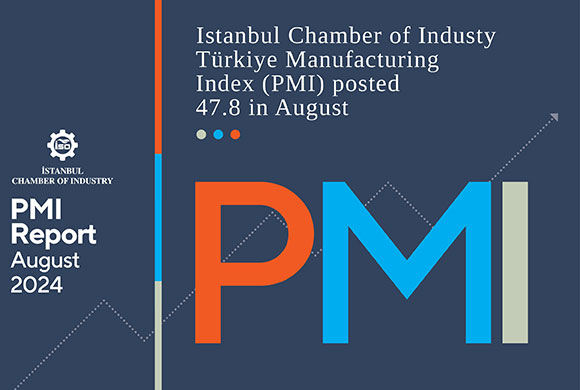ICI Türkiye Manufacturing PMI ticks up to 47.8 in August
- 01.09.2024
- News

The headline PMI posted 47.8 in August, up from 47.2 in July but still signalling a moderation in the health of the sector during the month. Challenging market conditions led to a further softening of new orders in August, the fourteenth in as many months. The rate of moderation was solid, despite easing to the weakest since May. Input costs continued to rise at a marked pace, albeit one that was slightly softer than in July. Currency weakness was the principal factor leading to higher input prices, while there were also reports of increases in costs for raw materials and logistics.
According to the Istanbul Chamber of Industry Türkiye Sectoral PMI report, in August, for the first time in a little over two years, output contracted in all ten monitored sectors. The sharpest decline in output was recorded in textile products. Employment fell in eight out of ten sectors, with the exceptions being chemicals, plastics and rubber, and machinery and metal products. Manufacturers also generally struggled to win new business from overseas customers. The only sector to show improvement in this area was electrical and electronic products, where new export orders increased for the first time in eight months.
Istanbul Chamber of Industry (ICI) released the August 2024 results of Türkiye Manufacturing PMI (Purchasing Managers’ Index) survey, which is recognized as the fastest and reliable indicator of the manufacturing industry’s performance in the economic growth. According to the results of the survey where any figure greater than 50.0 indicates overall improvement of the sector, the headline PMI posted 47.8 in August, up from 47.2 in July but still signalling a moderation in the health of the sector during the month. Business conditions have softened continuously since April.
Challenging market conditions led to a further softening of new orders in August, the fourteenth in as many months. The rate of moderation was solid, despite easing to the weakest since May. The picture for international demand was more positive, with new export orders returning to growth for the first time since June 2023. With overall demand conditions remaining subdued, firms scaled back their production, employment and purchasing activity in August. Price pressures exacerbated the slowdown in production, which was the most pronounced since November 2022.
DROP IN STOCKS OF PURCHASES
Input costs continued to rise at a marked pace, albeit one that was slightly softer than in July. Currency weakness was the principal factor leading to higher input prices, while there were also reports of increases in costs for raw materials and logistics. In response to higher input costs, manufacturers raised their own selling prices. Moreover, the rate of inflation quickened for the second month running to the fastest since April. Manufacturers displayed a reluctance to hold inventories at a time of subdued new orders, reducing their holdings of both purchases and finished goods during August. Furthermore, the drop in stocks of purchases was the strongest since July 2023.
Commenting on the Istanbul Chamber of Industry Türkiye Manufacturing PMI survey data, Andrew Harker, Economics Director at S&P Global Market Intelligence, said: "Turkish manufacturers again struggled to generate new order growth during August, despite some encouraging signs with regards to exports. The subdued overall demand picture led to further scaling back of production, employment and purchasing, with firms also showing a reluctance to hold inventories. Hopefully, the nascent recovery in exports seen in August will solidify in the months ahead and spread more widely to help the sector move into recovery mode.”
NEW ORDERS SOFTENED IN ALL TEN SECTORS
Türkiye's Sectoral PMI report showed that challenging business conditions continued in all of the Turkish manufacturing sectors. Increased prices and softening of orders led to a softening of new orders and output in general. Cost inflation remained high despite the decrease in input demand. On the other hand, suppliers' lead times shortened in many sectors. In August, for the first time in a little over two years, output contracted in all ten monitored sectors. Non-metallic mineral products was the only sector where this contraction slowed down and was the mildest compared to the previous month. The sharpest decline in output was recorded in textile products.
The decline in output in August stemmed from the weakness in new orders. New orders signaled a slowdown in all ten sectors, with the sharpest decline in new orders was recorded in textiles sector as in output. The mildest deceleration was recorded in machinery and metal products. Manufacturers also generally struggled to win new business from overseas customers. The only sector to show improvement in this area was electrical and electronic products, where new export orders increased for the first time in eight months.
SELLING PRICES INCREASED IN ALL MONITORED SECTORS
Firms scaled back their employment as a response to the decline in output requirements. Employment fell in eight out of ten sectors, with the exceptions being chemicals, plastics and rubber, and machinery and metal products. The most significant decline in the volume of employment was recorded in clothing and leather products. Despite the decline in input demand, input cost inflation remained significant in all sectors as of the middle of the third quarter. The fastest increase in cost inflation was recorded in non-metallic mineral products, while the slowest increase was in machinery and metal products. Similarly, selling prices increased in all monitored sectors, particularly in land and sea vehicles. The lowest selling price inflation was seen in textiles. The slowdown in input demand also contributed to easing pressure on supply chains in August. As a result, suppliers' lead times shortened in half of the monitored sectors. The most notable improvement in supplier performance was recorded in land and water vehicles sector, while the strongest increase was recorded in electrical and electronic products firms.
*You can find attached the Istanbul Chamber of Industry Türkiye Manufacturing PMI and Sector PMI August 2024 reports.